- Home
- Mark Wayne McGinnis
Scrapyard Ship
Scrapyard Ship Read online
SCRAPYARD SHIP
Written By
Mark Wayne McGinnis
Copyright © 2013 by Mark Wayne McGinnis
All rights reserved. No part of this publication may be reproduced, distributed, or transmitted in any form or by any means, including photocopying, recording, or other electronic or mechanical methods, without the prior written permission of the publisher, except in the case of brief quotations embodied in critical reviews and certain other noncommercial uses permitted by copyright law. For permission requests, write to the publisher, addressed “Attention: Permissions Coordinator,” at the address below.
This book is a work of fiction. Names, characters, places, and incidents either are products of the author’s imagination or are used fictitiously. Any resemblance to actual persons, living or dead, events, or locales is entirely coincidental.
Edited by:
Lura Lee Genz and Rachel Weaver.
Avenstar Productions
14717 Vine Street
Thornton, Co. 80602
int.ver52c
ISBN: 978-615-89264-1
www.markwaynemcginnis.com
To the wonderful, inspirational, women in my life:
my mother, my sister, and loving wife.
Table of Contents
Title Page
Copyright
Dedication
Prologue
Chapter 1
Chapter 2
Chapter 3
Chapter 4
Chapter 5
Chapter 6
Chapter 7
Chapter 8
Chapter 9
Chapter 10
Chapter 11
Chapter 12
Chapter 13
Chapter 14
Chapter 15
Chapter 16
Chapter 17
Chapter 18
Chapter 19
Chapter 20
Chapter 21
Chapter 22
Chapter 23
Chapter 24
Chapter 25
Acknowledgments
Prologue
“Captain, we’ll intersect with the Banyan in… looks like two minutes,” Ensign Smothers reported, looking almost as weary as the captain felt.
“What’s the last count—now that the Malgos have turned tail on us and run?” Captain Larimer asked him, with contempt and disgust in his voice.
“We still have close to two thousand vessels, sir.”
“That means little to me, Ensign, break it down.”
“Twenty super carriers, one hundred heavy battle cruisers, seven hundred light battle cruisers, six hundred destroyers, and an assortment of smaller corvettes, private schooners, trawlers, supply tankers… anything that’s space worthy and packs a punch is here, holding the line.” The ensign got up and stretched. “Coffee, sir?”
“Yeah, three sugars,” the captain said, looking up and realizing the bridge was nearly deserted. He’d sat straight through two shifts, getting up only for bathroom breaks and coffee. Their warship was the largest, most sophisticated vessel the United Planetary Alliance had constructed yet—a super carrier on a massive scale. At almost a mile long, the Prodigy was capable of launching hundreds of fighters in mere minutes. Two hundred rail guns, and who the hell knew how many plasma pulse cannons were configured around the ship’s hull. If twenty of these gargantuan vessels can’t stop the Craing, then nothing would, he thought, tiredly.
Captain Larimer wanted to put their heads on pikes, the whole damn species if he could. Two years previously, on a planet not so different from Earth, the Craing had leveled his home in a fiery blast—killing his wife and children. His story wasn’t unique; the Craing had touched the lives of every crewmember onboard ship, as well as the thousands of others assembling today.
Finally, the moment was at hand; they’d pooled their forces. An alliance had been built—planets and star systems reaching hundreds of light years away—out to distant sectors. And now they waited. One last time. As expected, the Craing were arriving—one of their many massive fleets was ready to do battle. A warring fleet ready to obliterate anyone and anything that got in its way. But this time things would be different.
The captain looked at the primary display in front of him; they’d amassed their allied fleet into a cohesive, united military front—which in itself was nothing short of a miracle.
Morning shift had just begun and crewmembers were filling the empty seats at quiet consoles. Ensign Smothers handed the captain his coffee, and they stood together at the rear of the bridge, a bridge about the size of a small supermarket back home. Both men watched as a pretty crewmember, one with violet skin and amazingly long eyelashes, walked by with a virtual clipboard.
The captain smiled as his eyes followed her across the bridge. “…if I were just five years younger…”
“Five years?” the ensign quipped out of the side of his mouth, with a rye smile on his face.
“OK, maybe ten.” The two men laughed briefly but quickly choked it off with the full realization of what the day would bring—the largest interstellar battle in recorded history. Captain Larimer mentally rehearsed their massive planned assault. Could they possibly be more, or better prepared?
“Contacts!” one of the now on-duty crewmembers bellowed from his console. Eight large displays lit up with the current optics. The bridge went still—a momentary lapse in which comprehension hadn’t quite caught up with what the brain had already figured out.
“We’re not outnumbered, sir, but we may not have the advantage we were counting on,” the ensign said, with an edge to his voice.
“Okay, bring us about to heading four six five—let’s not give them such a big target to shoot at.”
“They’ve got a lock on the Crescent Moon and the Bravo, sir. Incoming! Wide dispersal, looks like medium-yield conventional missiles.”
The barrage had emanated from one of the Craing Dreadnaughts. All eyes were on the main display as four yellow icons closed in on the Crescent Moon, and then another four on the Bravo. Fortunately, the Crescent Moon’s attitude was perpendicular to the Dreadnaught—a poor target.
Two of the forward displays zoomed in on the balance of the approaching Craing fleet. Studying their vessel formation, the captain reckoned the Craing warship armada was not so different from that of the Alliance. He took it all in—analyzing their configuration; there were only four Dreadnaughts though those Goliaths dwarfed even the Alliance’s super carriers. The remaining vessels were an odd assortment of super carriers, light carriers, and destroyers. All had the same insect-like design. The destroyers appeared the most menacing, with their squat, beetle-like build. Recent reconnaissance provided had shown they were the newest addition to the Craing fleet, and by far the most dangerous. Until recently, the Craing preferred energy weapons, but these destroyers were also equipped with turret-mounted rail guns—not dissimilar to those used by the Alliance—but, he feared, more effective.
“Crescent Moon’s shields held, but she can’t withstand another barrage like that last one,” said the ensign. Crew members watched as the remaining four icons approached the Bravo.
“Zoom in,” the captain commanded. Time seemed to stand still as all four Craing missiles hit the battle cruiser broadside simultaneously. In the vacuum of space, the explosions were minimal, but the damage was obviously catastrophic. The Bravo’s hull breached at its four impact locations, causing the ship to first segment into four distinct pieces, and then each piece, subsequently, exploded separately.
“Let’s move to shield the Crescent Moon’s flank. With repairs—perhaps she’s still in the fight,” the captain said, now pacing up and down the length of the bridge.
Ensign Smothers listened to a ha
il and turned to the captain. “In from Command: the admiral wants each of the super carriers to actively join the party.”
“Good—it’s time to see how that invading swarm handles several thousand fighters and fusion-tipped missiles. Maybe that’ll even the score some.”
Even before he voiced it, the captain reminded himself it wasn’t the Craing weapons they feared; it was their damn shields—almost impervious to energy or projectile weaponry assaults. More often than not, the Craing simply outlasted their adversaries. What he would give to capture one of those damn ships. Sure, they could be destroyed by nukes, but disabling one, actually capturing one, had not been done.
The captain stepped over to the helm pilot. At this point the entire fleet was engaged. While the Alliance maintained an orderly in-line configuration of ships, the Craing were willy-nilly all over space.
The helmsman looked up and said, “The Alliance firing solutions are 4.6 times more effective than the Craing, sir. I mean, we’re unleashing a hell-storm on their ships—but they’re not going down.”
The captain realized before his crew, but eventually they would come to the same conclusion. His stomach sank. They were going to lose the battle today. After years of combat experience—most of that in command—he just knew. He turned and surveyed the bridge. An exceptional crew. They were all professionals, he thought to himself, battle worthy; they’d accepted the possibility of defeat when they first signed on. Even though they’d heard the awful stories—stories that bounced around the sector for years. They began with several captured crewmen, who’d somehow escaped from the Craing. They’d painted a clear picture: get captured in battle by the Craing and you'll end up becoming a part of their sick religious rituals—one that involved being sliced and diced and served up at meal time. Apparently, it was always worst directly following a battle. It had something to do with the Craing liking to consume their newly conquered.
“Incoming!” All eyes looked to the center display.
Chapter 1
Christ, he’d forgotten how hot San Bernardino got this time of year. Even without twenty or more windshields focused in his general direction, it would still be blistering. Jason looked out at a virtual sea of broken automobiles—acres and acres of chrome, plastic, and rusted steel. Lifeless headlights peered back at him. It was strange how the abandoned cars now seemed to be waiting for something. He wiped sweat from his stubbled chin. He needed a shave; he also needed a haircut. But why bother? Jason balanced his chair back on two legs and propped his feet up on the nearby table his Grandfather Gus had fashioned out of a welded stack of F-150 rims. It felt strange to be sitting on the porch Gus built by hand some twenty-odd years earlier. The property had been in his family for three generations, but Lord knows, Jason hadn’t expected to be back here again.
He reached for the last lukewarm bottle of beer from a now empty six-pack carton sitting at his feet—do they even make this brand anymore? He looked down at the water-stained cardboard with its big Blue Ribbon logo, now faded more into grey than blue… a telltale sign that Gus’ refrigerator’s contents had sat undisturbed for a long time.
Jason’s father, Admiral Perry Reynolds, disappeared fifteen years earlier. Grandpa Gus had taken up the parental reins—assuming both father and mother roles to Jason and his older brother, Brian. Conflicting stories about the admiral’s disappearance spanned from him being killed by a crazed interstate trucker, to speculation that he had run off with a girlfriend, someone named Lilly.
When old Gus died, the property was on a fast track toward foreclosure. Jason stepped in at the last moment to pay the necessary back taxes. As Jason looked out at the yard, he let out a long slow breath. My own little piece of Eden, he thought. Which was true. Because right now, he had no where else to go.
He noticed the black monitoring device snugly secured around his left ankle. It wasn’t always like this, he thought. He was both husband and father and, like his own father, a U.S. Navy officer. He had reached the place where his life had seemed, well… fairly settled, and for the most part he was content. With that said, commanding a naval vessel was often arduous and required a high-degree of dedication. Something Jason’s ex-wife complained about on a regular basis. But naval life fit him like a glove. His personality was well suited for weeks, even months at sea. Staring out at the hundreds, if not thousands, of scrapped vehicles, Jason was coming to terms with the bleak fact that his own military career was probably ending, along with his pension and the chance to reestablish family connections.
The last remaining rays of the sun bounced off an old Chevy Bel Aire’s bumper. Jason took a final swig of beer. He toasted the setting sun with his now empty bottle. “Here’s to house arrest, day two!” He collected the empty beer bottles and headed back into the house.
The kitchen window, along with the porch and whole rear of Gus’ house, enjoyed the same vista of the Central Valley Scrapyard. Jason hadn’t always thought of the property merely as a scrapyard. As a kid it was more like a magical playground. A place where he’d spent countless hours investigating and discovering what their modern-day-waste pile could conjure up. Summer mornings were especially filled with new and exciting adventures. Looking back at his youth, Jason’s embarrassment about where he lived occurred later, when he was well into his teens. That’s when rival school kids and buddies alike started teasing him, and girls…well, they wanted nothing to do with a boy from the neighborhood scrapyard. About that time, Jason stopped telling people where he lived. Jason chugged the last drops from his beer, set it down and walked into the house.
He pulled out his cellphone. Three bars. It was only after trial and error, running from room to room, that he’d discovered the kitchen was the golden place to make and receive calls. He dialed and by the third ring, Mollie answered.
“Dad?”
“Hey Kiddo, what are you up to?” Jason asked with enthusiasm.
“Just studying… well, MTV and studying. I got a Social Science test in the morning, and I can’t seem to concentrate. Last day of school—half day tomorrow!”
“Why don’t you turn off the TV? Maybe that will help.”
“No, that only makes it worse. I need background noise. Maybe I’ll put on a movie,” she said, thinking out loud.
Mollie was a straight-A student, which he never was, and so any advice from him would certainly be wasted. He changed the subject. “So what else is going on? Did you make up with your mother yet? You still grounded?”
Mollie paused. Then annunciating each and every word separately, she said: “Don’t–get-me-started, Dad, I’m-never–talking-to-that-woman-again!”
Jason barely held back laughing into the phone, just barely. At that moment he realized how much he’d missed the banter, the everyday problems, all the things that came with family. A lifestyle he no longer was a part of. “Well, don’t be too hard on her,” he said, with more conviction than he actually felt. “You’ll get plenty of space away from each other this summer.”
Beep. “Oops, I think I have a call waiting. You want to hold on, Dad?” But Jason could hear the call to greener pastures in her voice.
“No-no, sweetie, I’ll see you tomorrow. I’m really looking forward to our spending some time together. Get that studying done, OK? I love you.”
“Can’t wait—and I love you too, Dad… bye-bye.” She clicked off. Jason stood there, hovering over his grandfather’s battered old sink for a long while—hanging onto the hollow silence of a disconnected line.
* * *
A slow, heavy scraping sound woke Jason up in the middle of the night. He’d taken to sleeping on the couch in the family room, which was situated directly off the kitchen.
He squinted into the near total darkness, just barely able to make out the soft blue glow of the digital clock on the microwave: 3:23AM. Noises were common here—stray dogs running through the yard, cats on the hunt, and rodents scampering around. Most of those animals made their way into the yard at some point in time. Even a
fter all these years, Jason still knew what sounds were what: the gentle scraping of a hubcap against chain-link fencing, or something munching on the last vestiges of upholstery.
But this was a different kind of sound. There was an intelligence associated with it, like a pattern of noises joined together—something that required conscious thought. Jason sat up and listened, straining to hear anything abnormal. A minute passed without another sound. It must have just been a critter, he decided. Yawning, he started to lie back down… Hummmm, Chickink, Hummmm. It was coming from outside, somewhere out back. He went to the window and peeked out through the mini-blinds. He surveyed the property—a collection of dark geometric shapes, dimly lit by low-voltage security lights, which casted long, distorted shadows into the near-darkness. Jason could hear shuffling sounds, like feet moving.
It was in the tool shed. Jason needed a weapon. He remembered Gus always kept an old Louisville Slugger within easy reach of the back door. Gus was never big on firearms around the house, not since Brian, Jason’s older brother, was killed in a friendly-fire incident in Iraq. And there it was, right where Gus had left it, standing sentry by the sliding glass door. Jason snatched up the bat, slid open the door and tiptoed out onto the porch. The security lights didn’t quite reach the back of the house, so he had some semblance of stealth. He only wished he’d pulled on a pair of pants—it was hard to play tough-guy when you’re lurking outside in your boxers.
The shed, a patchwork of corrugated steel sheets and old pieces of plywood, was located about thirty yards behind the house. Like the hub of a big wagon wheel, multiple concrete pathways connected the shed to the rest of the scrapyard. Crouching down and trying to avoid the lights, Jason headed off in the direction of the strange noises. “Shit!” He swore as the soles of his bare feet crunched across a patch of broken headlight glass.
When he reached the back of the shed, he moved around to its side where there was a small blocked-off window and the shed’s only door. The noises were louder here—something electric, a buzzing sound.

 The Hidden Ship
The Hidden Ship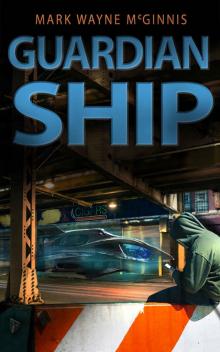 Guardian Ship
Guardian Ship Cloudwalkers
Cloudwalkers Mad Powers (Tapped In)
Mad Powers (Tapped In) Ship Wrecked
Ship Wrecked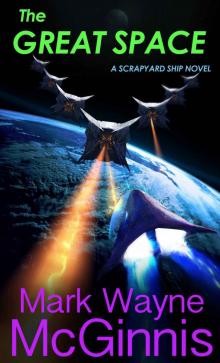 The Great Space (Scrapyard Ship Book 6)
The Great Space (Scrapyard Ship Book 6)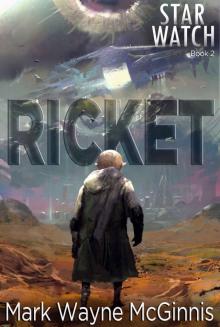 Ricket (Star Watch Book 2)
Ricket (Star Watch Book 2)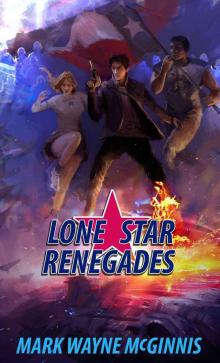 Lone Star Renegades
Lone Star Renegades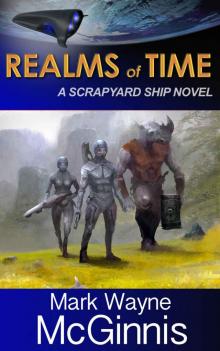 Realms of Time (Scrapyard Ship)
Realms of Time (Scrapyard Ship) Glory for Sea and Space (Star Watch Book 4)
Glory for Sea and Space (Star Watch Book 4)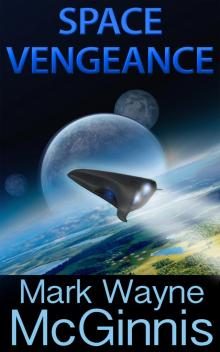 Scrapyard Ship 3 Space Vengeance
Scrapyard Ship 3 Space Vengeance Boy Gone
Boy Gone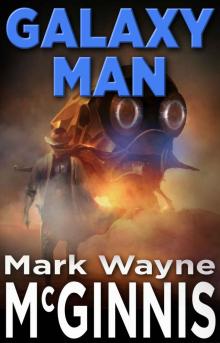 Galaxy Man
Galaxy Man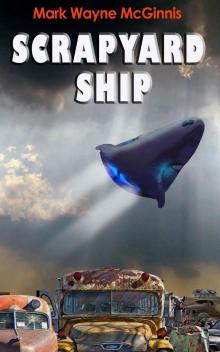 Scrapyard Ship
Scrapyard Ship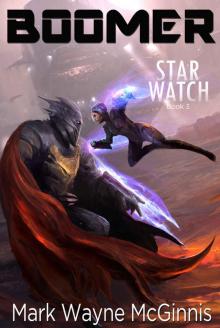 Boomer (Star Watch Book 3)
Boomer (Star Watch Book 3)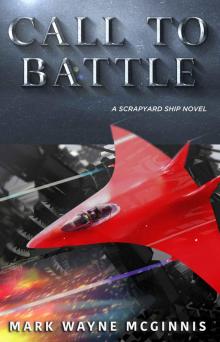 Scrapyard Ship 7: Call to Battle
Scrapyard Ship 7: Call to Battle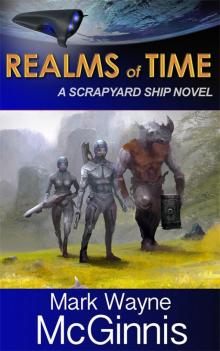 Scrapyard Ship 4 Realms of Time
Scrapyard Ship 4 Realms of Time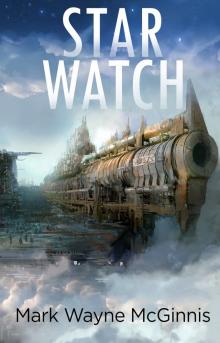 Star Watch
Star Watch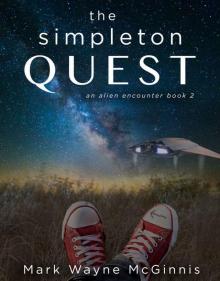 The Simpleton QUEST
The Simpleton QUEST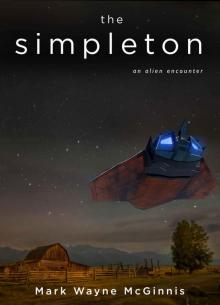 The Simpleton: An Alien Encounter
The Simpleton: An Alien Encounter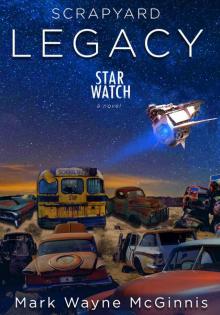 Scrapyard LEGACY (Star Watch Book 6)
Scrapyard LEGACY (Star Watch Book 6) Ship Wrecked: Stranded on an alien world
Ship Wrecked: Stranded on an alien world